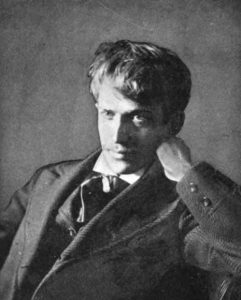Fleurs du Mal Magazine


Or see the index

Air and Angels
Twice or thrice had I lov’d thee,
Before I knew thy face or name;
So in a voice, so in a shapeless flame
Angels affect us oft, and worshipp’d be;
Still when, to where thou wert, I came,
Some lovely glorious nothing I did see.
But since my soul, whose child love is,
Takes limbs of flesh, and else could nothing do,
More subtle than the parent is
Love must not be, but take a body too;
And therefore what thou wert, and who,
I bid Love ask, and now
That it assume thy body, I allow,
And fix itself in thy lip, eye, and brow.
Whilst thus to ballast love I thought,
And so more steadily to have gone,
With wares which would sink admiration,
I saw I had love’s pinnace overfraught;
Ev’ry thy hair for love to work upon
Is much too much, some fitter must be sought;
For, nor in nothing, nor in things
Extreme, and scatt’ring bright, can love inhere;
Then, as an angel, face, and wings
Of air, not pure as it, yet pure, doth wear,
So thy love may be my love’s sphere;
Just such disparity
As is ‘twixt air and angels’ purity,
‘Twixt women’s love, and men’s, will ever be.
John Donne
(1572–1631)
Air and Angels
• fleursdumal.nl magazine
More in: Archive C-D, Archive C-D, Donne, John

Because I could not stop for Death
Because I could not stop for Death –
He kindly stopped for me –
The Carriage held but just Ourselves –
And Immortality.
We slowly drove – He knew no haste
And I had put away
My labor and my leisure too,
For His Civility –
We passed the School, where Children strove
At Recess – in the Ring –
We passed the Fields of Gazing Grain –
We passed the Setting Sun –
Or rather – He passed Us –
The Dews drew quivering and Chill –
For only Gossamer, my Gown –
My Tippet – only Tulle –
We paused before a House that seemed
A Swelling of the Ground –
The Roof was scarcely visible –
The Cornice – in the Ground –
Since then – ’tis Centuries – and yet
Feels shorter than the Day
I first surmised the Horses’ Heads
Were toward Eternity –
Emily Dickinson
(1830-1886)
Because I could not stop for Death
• fleursdumal.nl magazine
More in: Archive C-D, Archive C-D, Dickinson, Emily

XVIII
In Heaven,
Some little blades of grass
Stood before God.
“What did you do?”
Then all save one of the little blades
Began eagerly to relate
The merits of their lives.
This one stayed a small way behind
Ashamed.
Presently God said:
“And what did you do?”
The little blade answered: “Oh, my lord,
“Memory is bitter to me
“For if I did good deeds
“I know not of them.”
Then God in all His splendor
Arose from His throne.
“Oh, best little blade of grass,” He said.
Stephen Crane
(1871 – 1900)
In Heaven XVIII
• fleursdumal.nl magazine
More in: *War Poetry Archive, Archive C-D, Archive C-D, Stephen Crane

The Deceased
He was a reprobate I grant,
and always liquired till his money went.
His hair depended on a noose from
his pale brow, his eyes were dumb.
Like prisoners in their cavernous slots were
settled in attitudes of despair.
You who God bless you never sunk so low
censure and pray for him that he was so.
And with his failings you regret the verses
the fellow made, proberly between curses,
proberly in the extreames of moral decay
but he wrote them in a sincere way.
And seems to have felt a sort of pain
to which your imagination can not attain!
Keith Douglas
(1920 – 1944)
The Deceased
• fleursdumal.nl magazine
More in: Archive C-D, Archive C-D, Douglas, Keith, WAR & PEACE
Several years ago, a treasure trove containing some 6,000 original Bob Dylan manuscripts was revealed to exist. Their destination? Tulsa, Oklahoma.
 The documents, as essential as they are intriguing—draft lyrics, notebooks, and diverse ephemera— comprise one of the most important cultural archives in the modern world. Along with countless still and moving images and thousands of hours of riveting studio and live recordings, this priceless collection now resides at The Bob Dylan Center in Tulsa, Oklahoma, just steps away from the archival home of Dylan’s early hero, Woody Guthrie.
The documents, as essential as they are intriguing—draft lyrics, notebooks, and diverse ephemera— comprise one of the most important cultural archives in the modern world. Along with countless still and moving images and thousands of hours of riveting studio and live recordings, this priceless collection now resides at The Bob Dylan Center in Tulsa, Oklahoma, just steps away from the archival home of Dylan’s early hero, Woody Guthrie.
Nearly all the materials preserved at The Bob Dylan Center are unique, previously unavailable, and, in many cases, even previously unknown. As the official publication of The Bob Dylan Center, BOB DYLAN: MIXING UP THE MEDICINE is the first wide-angle look at the Dylan archive, a book that promises to be of vast interest to both the Nobel Laureate’s many musical fans and to a broader national and international audience as well.
Edited by Mark Davidson and Parker Fishel, BOB DYLAN: MIXING UP THE MEDICINE focuses a close look at the full scope of Dylan’s working life, particularly from the dynamic perspective of his ongoing and shifting creative processes—his earliest home recordings in the mid-1950s right up through Rough and Rowdy Ways (2020), his most recent studio recording, and into the present day.
The centerpiece of BOB DYLAN: MIXING UP THE MEDICINE is a carefully curated selection of over 600 images including never-before-circulated draft lyrics, writings, photographs, drawings and other ephemera from the Dylan archive.
With an introductory essay by Sean Wilentz and epilogue by Douglas Brinkley, the book features a surprising range of distinguished writers, artists and musicians, including Joy Harjo, Greil Marcus, Michael Ondaatje, Gregory Pardlo, Amanda Petrusich, Tom Piazza, Lee Ranaldo, Alex Ross, Ed Ruscha, Lucy Sante, Greg Tate and many others. After experiencing the collection firsthand in Tulsa, each of the authors was asked to select a single item that beguiled or inspired them. The resulting essays, written specifically for this volume, shed new light on not only Dylan’s creative process, but also their own.
BOB DYLAN: MIXING UP THE MEDICINE is an unprecedented glimpse into the creative life of one of America’s most groundbreaking, influential and enduring artists.
by Mark Davidson & Parker Fishel (Authors)
Publisher: Callaway
October 24, 2023
Language: English
Hardcover: 608 pages
ISBN-10: 1734537795
ISBN-13: 978-1734537796
Item Weight: 4.4 pounds
Dimensions: 8.5 x 2 x 11 inches
$50,00
• fleursdumal.nl magazine
More in: - Book News, - Bookstores, Archive C-D, Archive C-D, Bob Dylan, Dylan, Bob

The Rising Sun
Busy old fool, unruly Sun,
Why dost thou thus,
Through windows, and through curtains, call on us ?
Must to thy motions lovers’ seasons run ?
Saucy pedantic wretch, go chide
Late school-boys and sour prentices,
Go tell court-huntsmen that the king will ride,
Call country ants to harvest offices ;
Love, all alike, no season knows nor clime,
Nor hours, days, months, which are the rags of time.
Thy beams so reverend, and strong
Why shouldst thou think ?
I could eclipse and cloud them with a wink,
But that I would not lose her sight so long.
If her eyes have not blinded thine,
Look, and to-morrow late tell me,
Whether both th’ Indias of spice and mine
Be where thou left’st them, or lie here with me.
Ask for those kings whom thou saw’st yesterday,
And thou shalt hear, “All here in one bed lay.”
She’s all states, and all princes I ;
Nothing else is ;
Princes do but play us ; compared to this,
All honour’s mimic, all wealth alchemy.
Thou, Sun, art half as happy as we,
In that the world’s contracted thus ;
Thine age asks ease, and since thy duties be
To warm the world, that’s done in warming us.
Shine here to us, and thou art everywhere ;
This bed thy center is, these walls thy sphere.
John Donne
(1572–1631)
The Rising Sun
• fleursdumal.nl magazine
More in: Archive C-D, Archive C-D, Donne, John

The Ecstasy
Where, like a pillow on a bed
A pregnant bank swell’d up to rest
The violet’s reclining head,
Sat we two, one another’s best.
Our hands were firmly cemented
With a fast balm, which thence did spring;
Our eye-beams twisted, and did thread
Our eyes upon one double string;
So to’intergraft our hands, as yet
Was all the means to make us one,
And pictures in our eyes to get
Was all our propagation.
As ‘twixt two equal armies fate
Suspends uncertain victory,
Our souls (which to advance their state
Were gone out) hung ‘twixt her and me.
And whilst our souls negotiate there,
We like sepulchral statues lay;
All day, the same our postures were,
And we said nothing, all the day.
If any, so by love refin’d
That he soul’s language understood,
And by good love were grown all mind,
Within convenient distance stood,
He (though he knew not which soul spake,
Because both meant, both spake the same)
Might thence a new concoction take
And part far purer than he came.
This ecstasy doth unperplex,
We said, and tell us what we love;
We see by this it was not sex,
We see we saw not what did move;
But as all several souls contain
Mixture of things, they know not what,
Love these mix’d souls doth mix again
And makes both one, each this and that.
A single violet transplant,
The strength, the colour, and the size,
(All which before was poor and scant)
Redoubles still, and multiplies.
When love with one another so
Interinanimates two souls,
That abler soul, which thence doth flow,
Defects of loneliness controls.
We then, who are this new soul, know
Of what we are compos’d and made,
For th’ atomies of which we grow
Are souls, whom no change can invade.
But oh alas, so long, so far,
Our bodies why do we forbear?
They’are ours, though they’are not we; we are
The intelligences, they the spheres.
We owe them thanks, because they thus
Did us, to us, at first convey,
Yielded their senses’ force to us,
Nor are dross to us, but allay.
On man heaven’s influence works not so,
But that it first imprints the air;
So soul into the soul may flow,
Though it to body first repair.
As our blood labors to beget
Spirits, as like souls as it can,
Because such fingers need to knit
That subtle knot which makes us man,
So must pure lovers’ souls descend
T’ affections, and to faculties,
Which sense may reach and apprehend,
Else a great prince in prison lies.
To’our bodies turn we then, that so
Weak men on love reveal’d may look;
Love’s mysteries in souls do grow,
But yet the body is his book.
And if some lover, such as we,
Have heard this dialogue of one,
Let him still mark us, he shall see
Small change, when we’are to bodies gone.
John Donne
(1572–1631)
The Ecstasy
• fleursdumal.nl magazine
More in: Archive C-D, Archive C-D, Donne, John

Fame is a bee
Fame is a bee.
It has a song—
It has a sting—
Ah, too, it has a wing.
Emily Dickinson
(1830-1886)
Fame is a bee (1788)
• fleursdumal.nl magazine
More in: Archive C-D, Archive C-D, Dickinson, Emily

How to Kill
Under the parabola of a ball,
a child turning into a man,
I looked into the air too long.
The ball fell in my hand, it sang
in the closed fist: Open Open
Behold a gift designed to kill.
Now in my dial of glass appears
the soldier who is going to die.
He smiles, and moves about in ways
his mother knows, habits of his.
The wires touch his face: I cry
NOW. Death, like a familiar, hears
and look, has made a man of dust
of a man of flesh. This sorcery
I do. Being damned, I am amused
to see the centre of love diffused
and the wave of love travel into vacancy.
How easy it is to make a ghost.
The weightless mosquito touches
her tiny shadow on the stone,
and with how like, how infinite
a lightness, man and shadow meet.
They fuse. A shadow is a man
when the mosquito death approaches.
Keith Douglas
(1920 – 1944)
How to Kill
• fleursdumal.nl magazine
More in: Archive C-D, Archive C-D, Douglas, Keith, WAR & PEACE

Much Madness is divinest Sense
Much Madness is divinest Sense
To a discerning Eye –
Much Sense – the starkest Madness –
’Tis the Majority
In this, as all, prevail –
Assent – and you are sane –
Demur – you’re straightway dangerous –
And handled with a Chain –
Emily Dickinson
(1830-1886)
Much Madness is divinest Sense
• fleursdumal.nl magazine
More in: Archive C-D, Archive C-D, Dickinson, Emily

Death
A spirit sped
Through spaces of night;
And as he sped, he called,
“God! God!”
He went through valleys
Of black death-slime,
Ever calling,
“God! God!”
Their echoes
From crevice and cavern
Mocked him:
“God! God! God!”
Fleetly into the plains of space
He went, ever calling,
“God! God!”
Eventually, then, he screamed,
Mad in denial,
“Ah, there is no God!”
A swift hand,
A sword from the sky,
Smote him,
And he was dead.
Stephen Crane
(1871 – 1900)
Death. A spirit sped
•fleursdumal.nl magazine
More in: *War Poetry Archive, Archive C-D, Archive C-D, Stephen Crane

Song:
Sweetest love, I do not go
Sweetest love, I do not go,
For weariness of thee,
Nor in hope the world can show
A fitter love for me;
But since that I
Must die at last, ’tis best
To use myself in jest
Thus by feign’d deaths to die.
Yesternight the sun went hence,
And yet is here today;
He hath no desire nor sense,
Nor half so short a way:
Then fear not me,
But believe that I shall make
Speedier journeys, since I take
More wings and spurs than he.
O how feeble is man’s power,
That if good fortune fall,
Cannot add another hour,
Nor a lost hour recall!
But come bad chance,
And we join to’it our strength,
And we teach it art and length,
Itself o’er us to’advance.
When thou sigh’st, thou sigh’st not wind,
But sigh’st my soul away;
When thou weep’st, unkindly kind,
My life’s blood doth decay.
It cannot be
That thou lov’st me, as thou say’st,
If in thine my life thou waste,
That art the best of me.
Let not thy divining heart
Forethink me any ill;
Destiny may take thy part,
And may thy fears fulfil;
But think that we
Are but turn’d aside to sleep;
They who one another keep
Alive, ne’er parted be.
John Donne
(1572–1631)
Song: Sweetest love, I do not go
• fleursdumal.nl magazine
More in: Archive C-D, Archive C-D, Donne, John
Thank you for reading Fleurs du Mal - magazine for art & literature